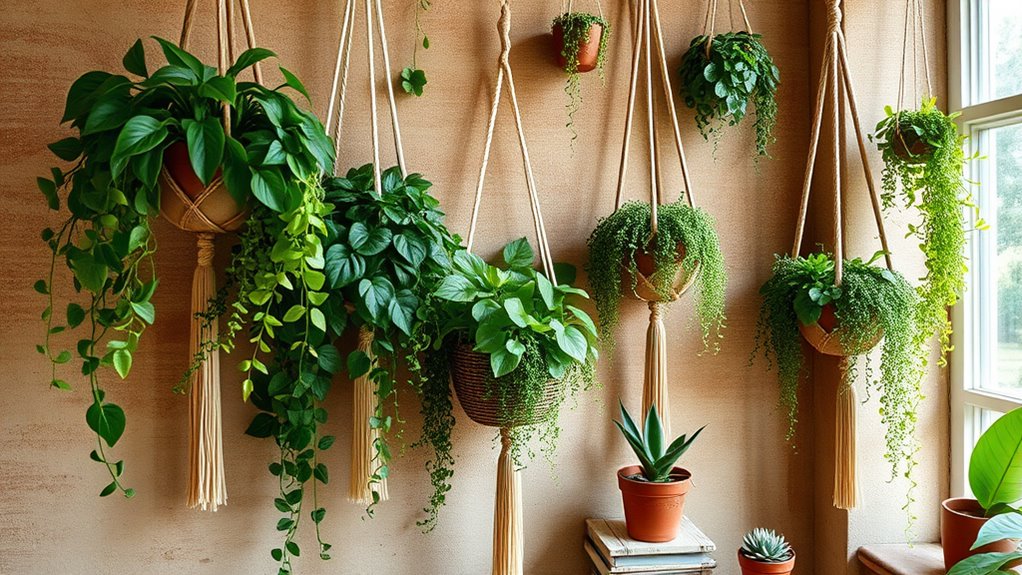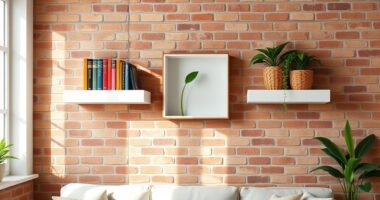To create a boho indoor green wall, start by choosing natural materials like wood, woven textiles, and vintage planters that reflect the free-spirited aesthetic. Select lush, textured plants like pothos, ferns, and succulents that thrive indoors. Plan your layout with varied textures and heights, and install a sturdy, eco-friendly structure on a well-lit wall. Incorporate decorative touches like wall hangings or fairy lights, and consider ongoing maintenance. Keep exploring for more tips to perfect your vertical garden.
Key Takeaways
- Measure and select an indoor wall with ample natural light and sturdy support for your vertical garden.
- Plan your layout using modular panels, hanging planters, or DIY structures to create a dynamic boho aesthetic.
- Choose natural materials like wood, terracotta, or woven baskets for planters that complement the boho style.
- Select lush, textured, and low-maintenance plants such as pothos, ferns, and succulents suited for indoor conditions.
- Install a waterproof backing and secure mounting system to ensure stability and protect the wall during the installation process.
Understanding the Boho Aesthetic and Its Inspiration
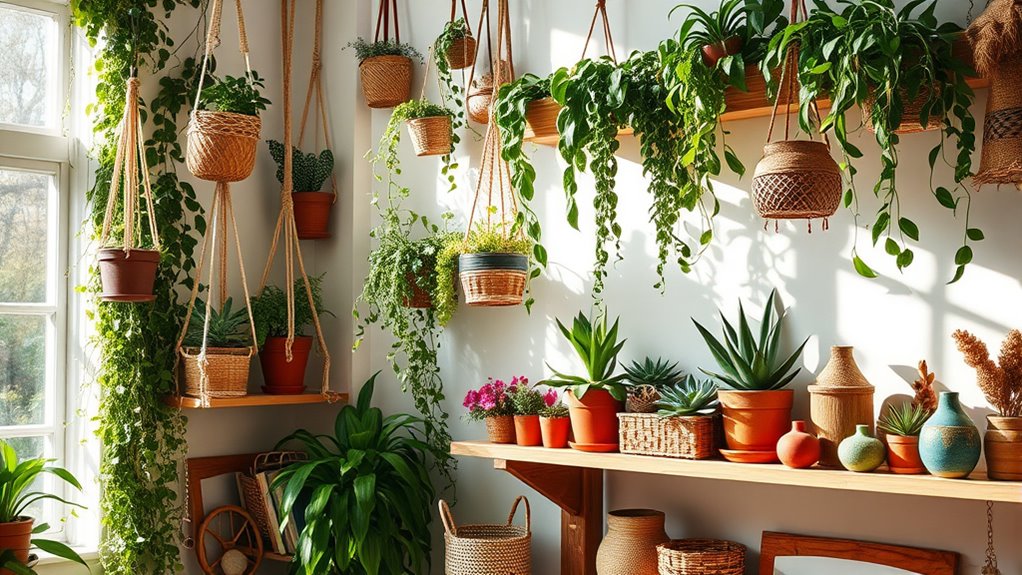
To truly create a boho green wall, you first need to understand the essence of the boho aesthetic. This style is all about blending unconventional, artistic, and laid-back decor elements inspired by bohemian and hippie cultures. It emphasizes natural materials like wood, jute, and woven textiles, which bring warmth and authenticity. The boho aesthetic thrives on personalization, encouraging you to mix textures, colors, and patterns to reflect your unique personality. Think globally inspired textiles—tribal prints, florals, and geometric designs—that evoke a free-spirited vibe. This style celebrates creativity and self-expression, so your green wall should mirror that relaxed, eclectic feel. When you embrace natural materials and personalize your space, your green wall becomes a true reflection of the boho lifestyle. Incorporating elements that connect to Hopi Tribe traditions can also add cultural depth and meaningful symbolism to your design. Additionally, paying attention to color harmony ensures that your green wall complements the overall aesthetic and creates a cohesive look. Enhancing the visual interest with layered textures can further emphasize the bohemian charm and make the space more inviting. Moreover, understanding vetted design principles can help you craft a balanced and visually appealing green wall setup.
Selecting Perfect Plants for Your Indoor Garden
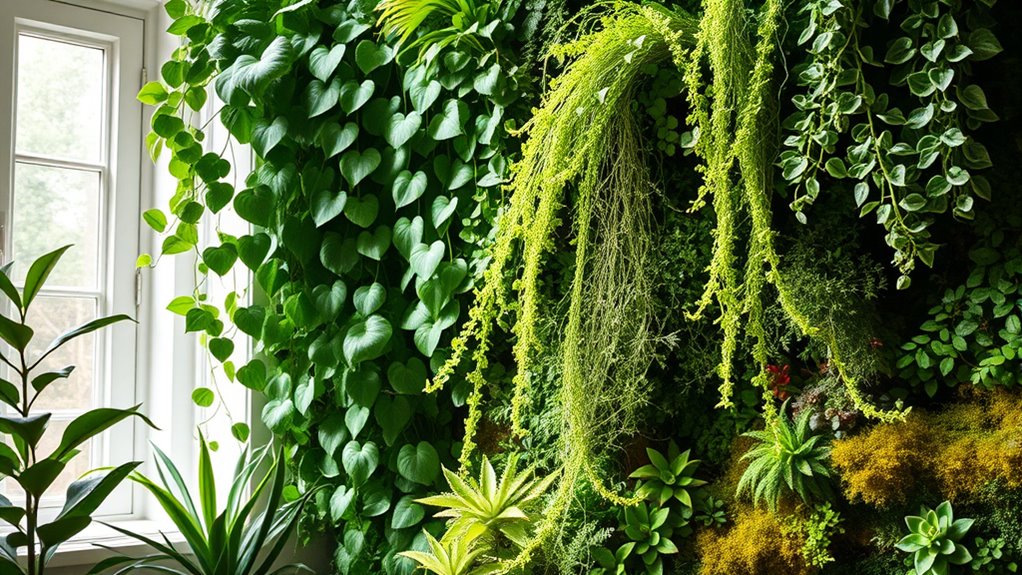
Choosing the right plants is crucial to creating a vibrant and cohesive boho green wall. When selecting indoor plants, focus on lush, textured foliage like pothos, ferns, and monstera to add depth and a layered feel. Include low-maintenance species such as succulents and cacti for easy care, especially if you’re new to plant care. Opt for plants that thrive in indirect light, like snake plants and alocasia, to ensure they stay healthy indoors. Mix variegated and exotic foliage to boost visual interest and enhance the boho aesthetic. Additionally, prioritize air-purifying plants like pothos and bamboo to improve indoor air quality while decorating your green wall. Incorporating plant care tips can help ensure your plants remain healthy and vibrant over time. Selecting plants with resilience to indoor conditions can further ease maintenance and promote longevity. Choosing plants with adaptability to lighting variations can help them thrive in different indoor environments, making your vertical garden more sustainable. Emphasizing drought tolerance can also make your green wall more resilient during busy or dry periods. To further support your indoor garden’s success, understanding plant growth habits can help you arrange and care for your plants more effectively. Thoughtful plant selection brings your vertical garden to life with texture, color, and vitality.
Planning Your Vertical Garden Layout
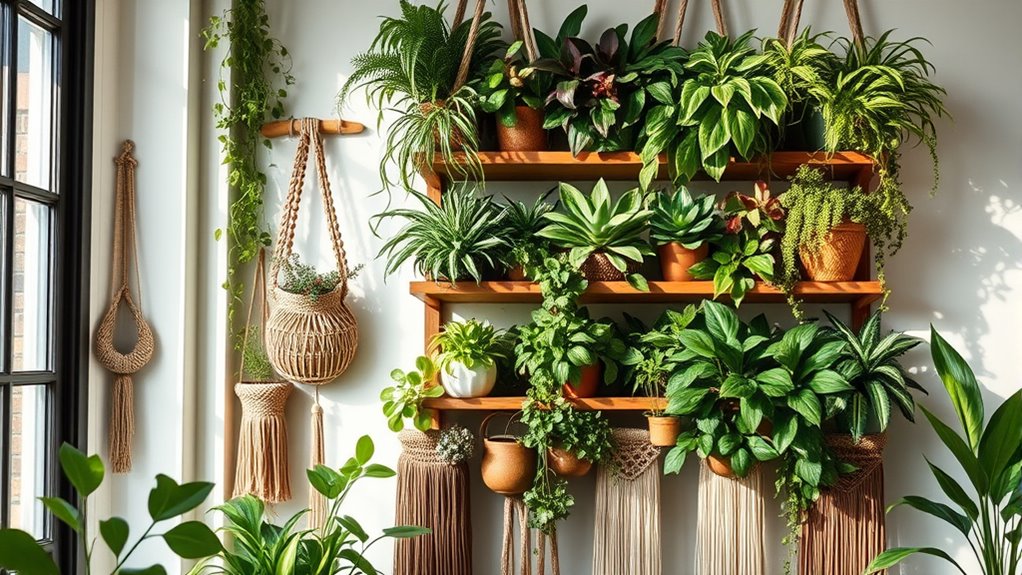
Before you start arranging your green wall, it’s essential to plan the layout carefully. Measure your wall space to determine the ideal size and shape for your vertical garden, keeping nearby furniture and fixtures in mind. Decide on a plant layout that complements your indoor spaces, whether you prefer a grid, cascading, or asymmetrical design to add visual interest. Choose plants suited to your light exposure, humidity, and maintenance needs to ensure they flourish indoors. Also, plan for irrigation and drainage, like drip or sub-irrigation systems, to keep your plants healthy and prevent wall damage. Use the table below to visualize your layout options and ensure a balanced distribution of plant sizes, colors, and textures.
| Layout Type | Key Features |
|---|---|
| Grid | Symmetrical, organized |
| Cascading | Dripping, flowing look |
| Asymmetrical | Dynamic, natural appearance |
| Modular | Flexible, customizable |
| Mixed | Diverse textures and heights |
Choosing the Right Materials and Planters

When selecting planters, consider materials that match your boho style, like terracotta, wood, or woven fabrics, to create a natural look. Lightweight options such as fiberglass or polymer make installation easier, especially indoors. Mix open and enclosed styles, ensuring they have proper drainage, to add visual interest and keep your plants healthy. Incorporating visualization techniques can help you imagine how different planters will complement your space before making a choice. Additionally, choosing planters with durable materials can enhance longevity and maintain aesthetic appeal in a boho-inspired indoor garden. To ensure your planters last, select those made from weather-resistant materials, especially if you plan to move or change your setup frequently. Considering plant compatibility can also help in selecting the right planters that suit the specific needs of your indoor garden. Using appropriate drainage methods can further support healthy plant growth and prevent overwatering issues.
Material Compatibility
Selecting the right materials for your boho green wall is essential to guarantee both aesthetics and durability. Your planters should be made from breathable, natural materials like woven baskets, terracotta, or wood to enhance the boho vibe. Choose lightweight, durable materials such as polymer composites or high-quality artificial plants to prevent stress on your wall structure. Proper drainage is *vital*—ensure your planters have adequate drainage or include drainage layers to avoid water buildup and root rot. Additionally, selecting weather-resistant and eco-friendly materials that align with the boho ethos can further ensure your green wall remains vibrant and secure over time. When choosing materials, consider their customer-reviewed durability and suitability for indoor environments to maximize longevity and visual appeal. Additionally, match the materials and sizes of your planters to your wall’s weight capacity and the plants you select, ensuring stability and long-lasting beauty in your indoor vertical garden. Incorporating appropriate drainage solutions can help maintain healthy plant roots and prevent structural issues over time. For added longevity, look into materials that are UV-resistant to withstand indoor lighting conditions and potential humidity fluctuations. Moreover, selecting sustainable materials can enhance the eco-friendly aspect of your indoor garden while supporting environmental conservation.
Planter Styles
Choosing the right planters for your boho green wall involves selecting materials that enhance the aesthetic while ensuring functionality. The right planter styles can add texture and character to your wall while supporting healthy plants. Natural materials like woven baskets, terracotta, or recycled wood complement the boho vibe and blend seamlessly with your plants. Consider hanging planters such as macramé hangers or wall-mounted pots to maximize space and create visual interest. Lightweight, durable options like polymer composites or resin are practical for indoor installation. Upcycled or vintage containers—like teapots or suitcases—add an eclectic touch. Remember to incorporate proper drainage or trays to keep your wall healthy and thriving. Additionally, understanding plant care requirements can help you select containers that promote optimal growth. These choices will help you craft a vibrant, personalized green wall.
Step-by-Step Guide to Building Your Living Wall
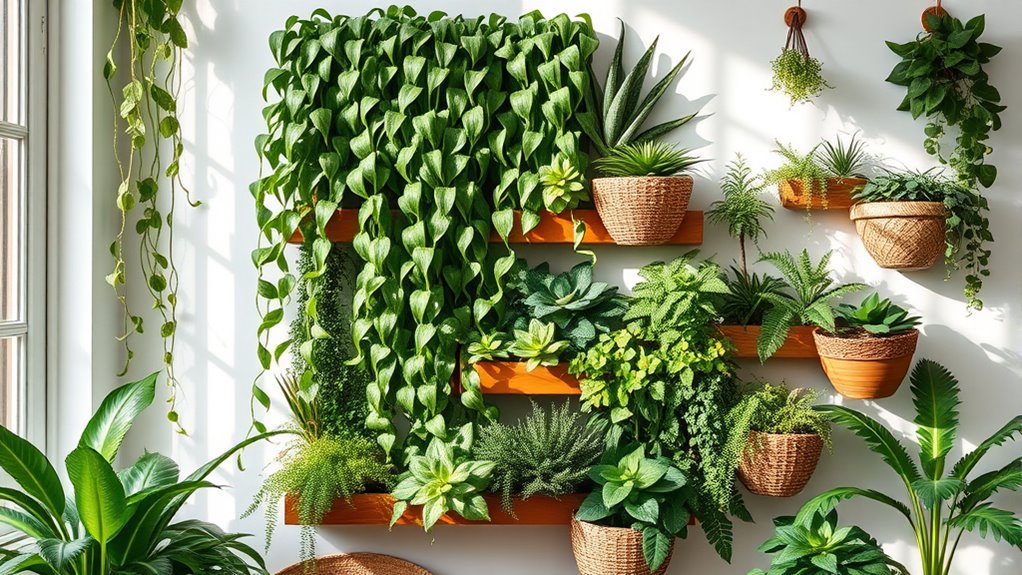
Start by measuring your wall space to plan the size and layout of your living wall, making certain there’s enough light and access for upkeep. Choose plants that suit your lighting conditions and aesthetic, then install sturdy wall-mounted planters or panels. To help maintain plant health, incorporate proper drainage into your design. Additionally, selecting suitable plant varieties can enhance the overall health and visual appeal of your living wall. Incorporating a variety of textures and heights will create a more dynamic and engaging display. Furthermore, using unique and wicked planters can add an extra touch of creativity to your installation. Finally, arrange your plants with variety in texture and height, and guarantee proper drainage for a healthy, vibrant display. To ensure your plants stay well-watered and healthy, consider incorporating self-watering planters into your design.
Planning Your Design
To craft a stunning boho green wall, you need to plan your design carefully from the outset. Start by selecting an indoor wall space that receives ample natural light and can support the weight of your vertical garden. Measure the area precisely to determine the perfect size and shape, ensuring it complements your space and aesthetic. Choose a plant palette that aligns with your boho style, mixing textures, colors, and foliage types for visual interest. Decide on the vertical garden system that fits your skill level and design vision, whether modular panels, hanging planters, or DIY structures. Also, plan your watering and maintenance approach—consider built-in irrigation, self-watering systems, or manual care routines to keep your indoor plant wall thriving. Additionally, understanding interior design planning can help you create a functional and cohesive space that enhances your living environment, ensuring your living wall remains vibrant and healthy.
Assembling the Wall
Building your living wall begins with selecting a sturdy, flat surface that can support the weight of your vertical gardens and plant wall setup. Measure the space carefully to plan your vertical gardens’ dimensions. Next, install a waterproof backing or moisture barrier to protect the wall from excess water. Attach a grid or frame system designed to hold planters or modules securely in place. Use wall-mounted planters, waterproof pockets, or modular panels with built-in watering systems, ensuring each component is level and firmly attached. Arrange your artificial or preserved plants according to your design, fixing them securely into the planters or panels, and leave space for future additions. Finally, test the stability of the entire wall, then add lighting or decorative touches, ensuring everything is securely in place.
Incorporating Textures and Decorative Elements
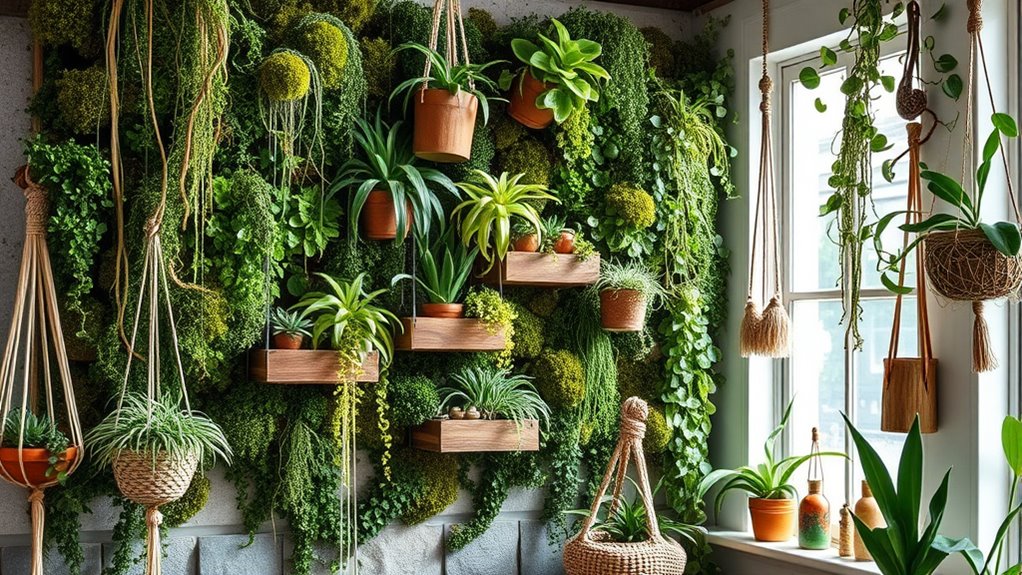
Adding textures and decorative elements is key to creating a vibrant boho green wall that feels inviting and personalized. By mixing different textures and accents, you enhance visual interest and depth. Incorporate textiles like macramé, jute, lace, or ethnic rugs to add tactile richness. Use decorative planters such as woven baskets, terracotta pots, or repurposed items like vintage teapots and suitcases to boost personality. Layer various plant varieties with different leaf shapes, sizes, and textures—think ferns, succulents, or variegated foliage—to create a lush, multidimensional look. You can also add textured wall hangings, framed botanical prints, or woven art to deepen the visual complexity. Small decorative touches like beads, trinkets, or fairy lights will further enhance the cozy, eclectic boho vibe.
Maintaining and Caring for Your Green Wall
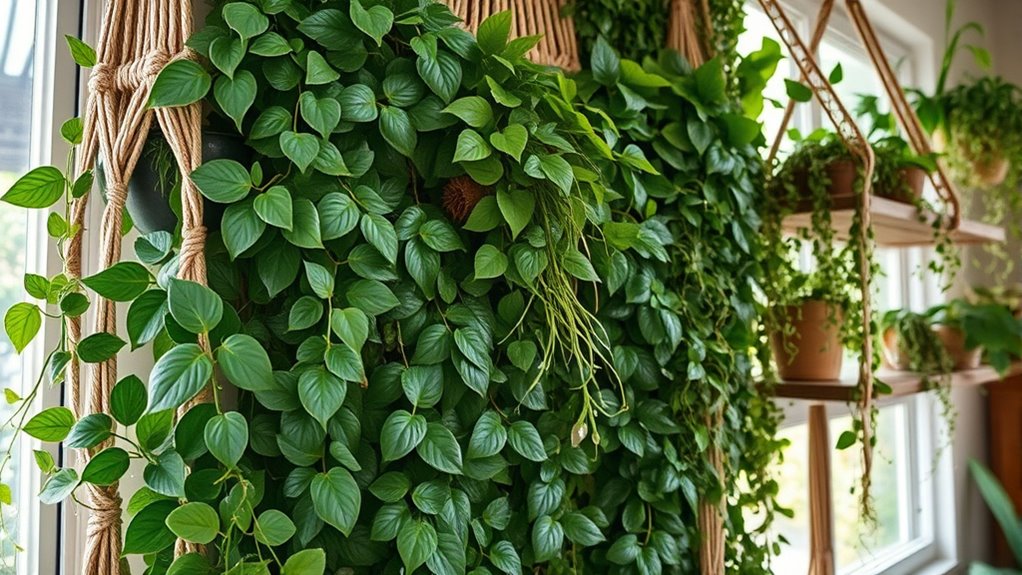
Maintaining a green wall requires regular attention to keep your plants healthy and vibrant. Start by checking for dust and debris on the plants and surfaces, gently cleaning with a soft brush or damp cloth. Prune and trim your plants as needed to prevent overgrowth, ensuring they stay healthy and visually balanced. Proper watering is essential; monitor moisture levels regularly and adjust your watering system to prevent overwatering or drought stress. Inspect the watering system for clogs or leaks, making sure water distributes evenly across all plants. Promptly replace or refresh any dead or unhealthy plants to keep your green wall lively. Consistent maintenance will ensure your vertical garden remains a beautiful, thriving focal point in your space.
Creative Ideas to Personalize Your Boho Indoor Garden
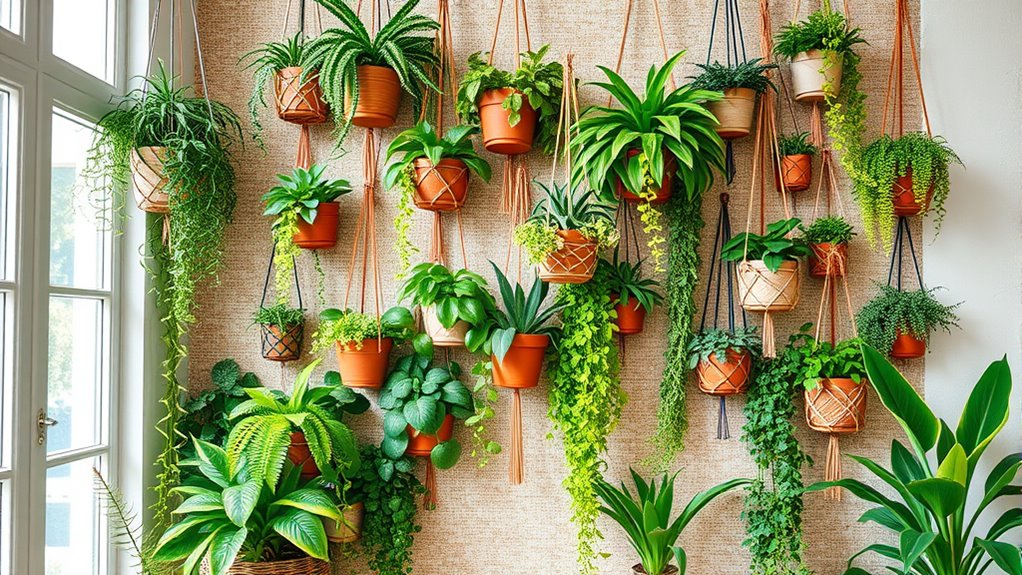
To truly personalize your boho indoor garden, start by incorporating diverse textures and patterns that reflect your style. Mixing textiles like macramé, jute, and ethnic rugs adds visual interest and tactile variety. Use eclectic planters—woven baskets, vintage teapots, or repurposed suitcases—to make your plants stand out and enhance the boho vibe. Hang string lights, lanterns, or fairy lights to create a warm, inviting glow that complements the relaxed atmosphere. Add decorative accessories like colorful pillows, wall art, or framed botanical prints to make the space uniquely yours and soften the overall look. Experiment with layering different plant types and sizes—hanging succulents, climbing vines, small potted ferns—to make your indoor jungle lush and truly personalized.
Tips for Engaging With the Indoor Plant Community

Engaging with the indoor plant community can considerably enhance your gardening experience and inspire new ideas for your boho green wall. By actively participating, you can share ideas, ask questions, and learn from others. Join online forums, social media groups like @chhajedgardens, or local workshops to connect with fellow plant enthusiasts. Sharing your projects with community hashtags invites feedback, encouragement, and advice, helping you grow as a gardener. Comment on posts, contribute your experiences, and stay updated on trends through expert blogs and accounts. Building relationships within the indoor plant community not only improves your skills but also makes gardening more enjoyable. Use the table below to explore various ways to engage effectively:
| Method | Benefit |
|---|---|
| Join online groups | Share ideas, gain inspiration |
| Attend plant swaps | Exchange tips, meet local gardeners |
| Follow expert accounts | Stay updated on trends |
| Share your projects | Receive feedback and encouragement |
| Comment and ask questions | Foster community and learning |
Frequently Asked Questions
How to Make an Interior Green Wall?
To make an interior green wall, you start by choosing a suitable wall space with good natural light or add grow lights. Select lightweight, breathable materials like moss panels or fabric pockets, and securely mount them with the right hardware. Fill your system with indoor-friendly plants such as pothos or ferns, then regularly water, prune, and check drainage to keep your green wall thriving and vibrant.
Are There Any Drawbacks to Using Vertical Gardens?
You might worry about drawbacks when installing a vertical garden. They can develop mold or mildew if not well-ventilated, and maintenance costs can add up, especially for pruning and repairs. Water leakage might damage your walls or furniture if drainage isn’t managed properly. Plus, some systems need technical skills for setup and upkeep. Over time, plants may die or outgrow the space, requiring regular replacements.
What Is the Difference Between Moss Wall and Green Wall?
A moss wall is like a preserved snapshot of nature, while a green wall is a living, breathing artwork. You’ll find moss walls use preserved moss, needing no watering or sunlight, making them low-maintenance. Green walls, on the other hand, feature live plants that require regular care, watering, and sunlight. Moss walls stay consistent over time, whereas green walls change with seasons and need ongoing upkeep.
How to Make a Vertical Garden Wall?
To make a vertical garden wall, start by choosing the right wall space and designing your layout with plants, containers, and decorative touches that match your style. Use wall-mounted planters or DIY frames from reclaimed materials for an eclectic look. Opt for lightweight containers like woven baskets or vintage items. Install a watering system to keep plants healthy, and regularly prune and rearrange to maintain a lively, vibrant display.
Conclusion
Think of your boho green wall as a vibrant tapestry, each plant a colorful thread weaving life and personality into your space. As you nurture it, your garden becomes a living artwork, inviting nature’s calm and creativity indoors. With patience and care, your vertical garden will flourish like a lush forest in miniature, transforming your home into a sanctuary where beauty and growth intertwine seamlessly.

